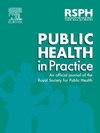Protecting the American dream for socially vulnerable families: An evaluation of state-level policies to improve housing security and protect mobile home communities
IF 1.9
Q2 PUBLIC, ENVIRONMENTAL & OCCUPATIONAL HEALTH
引用次数: 0
Abstract
Background
Manufactured and mobile homes are the largest source of unsubsidized affordable housing in the U.S. However, mobile home residents face unique challenges and are at greater risk of housing instability. State-level policies to enhance the regulation of mobile home parks and expand protections for residents are needed to address these challenges. The purpose of this study was to evaluate the implementation process and impact of newly enacted mobile home park policies on the housing security of Colorado residents and to identify policy implementation hurdles and successes. Study Design: Policy implementation evaluation using mixed methods.
Methods
Ten mobile home parks in three small-to-medium sized communities in Colorado were invited to participate in the evaluation conducted between 2020 and 2022. The mixed methods policy implementation evaluation included cross-sectional surveys of mobile home park residents (n = 356), qualitative interviews with community advisory groups (n = 24), and focus groups with community residents (n = 12). Data were triangulated to identify themes related to policy implementation successes and challenges.
Results
Evaluation findings elevate mobile home park residents' lived experiences and summarize challenges related to implementation of Colorado's mobile home park policies. A substantial lag in policy implementation was observed. Notably, the infrastructure necessary to implement and monitor adherence to the new policies had to be developed. Among mobile home park residents, fear of retaliation from property owners, park management, and oversight agencies remained a significant barrier to policy effectiveness despite the new protections offered by the state-level policies.
Conclusions
Translation of policies into practice takes time and resources. Recommendations to enhance policy implementation are to ensure adequate allocation of inputs and resources to support implementation across multiple levels, including the infrastructure essential to monitor and enforce policy adherence, and educational materials paired with a strong communication plan to improve residents’ awareness and capacity to navigate the new policies.
保护社会弱势家庭的美国梦:对改善住房安全和保护移动家庭社区的州级政策的评估
在美国,人造房屋和移动房屋是无补贴经济适用房的最大来源。然而,移动房屋的居民面临着独特的挑战,并且面临着更大的住房不稳定风险。应对这些挑战需要国家层面的政策来加强对移动住宅公园的监管,并扩大对居民的保护。本研究的目的是评估新颁布的活动房屋公园政策的实施过程和对科罗拉多州居民住房安全的影响,并确定政策实施的障碍和成功。研究设计:使用混合方法评估政策实施。方法在2020年至2022年期间,邀请科罗拉多州三个中小型社区的10个移动房屋公园参与评估。政策实施评估的混合方法包括对活动房屋公园居民的横断面调查(n = 356)、对社区咨询小组的定性访谈(n = 24)和对社区居民的焦点小组(n = 12)。对数据进行三角分析,以确定与政策执行成功和挑战有关的主题。结果评估结果提升了活动房屋公园居民的生活体验,并总结了与科罗拉多州活动房屋公园政策实施相关的挑战。在政策执行方面有很大的滞后。值得注意的是,必须发展执行和监测遵守新政策的必要基础设施。尽管国家层面的政策提供了新的保护措施,但在活动房屋公园的居民中,对财产所有者、公园管理机构和监督机构的报复的恐惧仍然是政策有效性的重大障碍。结论将政策转化为实践需要时间和资源。加强政策实施的建议是确保充分分配投入和资源,以支持在多个层面上的实施,包括监督和执行政策遵守所必需的基础设施,以及与强有力的沟通计划相结合的教育材料,以提高居民对新政策的认识和理解能力。
本文章由计算机程序翻译,如有差异,请以英文原文为准。
求助全文
约1分钟内获得全文
求助全文

 求助内容:
求助内容: 应助结果提醒方式:
应助结果提醒方式:


